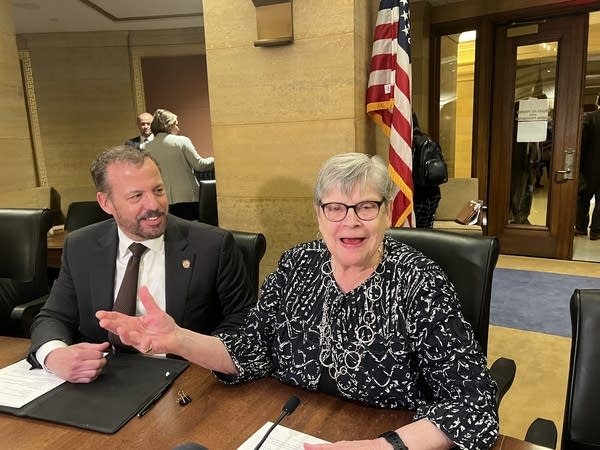Questions swirl around corporate tax in Minnesota House, Senate budgets

Go Deeper.
Create an account or log in to save stories.
Like this?
Thanks for liking this story! We have added it to a list of your favorite stories.
A proposed corporate tax that’s central to a budget being assembled in the Minnesota Legislature is surrounded by questions over its viability, with even the Department of Revenue acknowledging risk about the money materializing.
A measure known as worldwide combined reporting is part of House and Senate tax bills and would put more corporate income in reach of Minnesota tax collectors. DFL lawmakers argue it would level the playing field between companies with a global reach and those with only domestic operations.
Senate Taxes Committee Chair Ann Rest, DFL-New Hope, said Wednesday the proposal was designed to raise revenue to cover other costs without raising taxes that would touch most Minnesotans.
“We wanted that tax increase the furthest away from individual Minnesotans, almost to the point where we have the members of this tax committee not even knowing what that tax is,” she said.
Turn Up Your Support
MPR News helps you turn down the noise and build shared understanding. Turn up your support for this public resource and keep trusted journalism accessible to all.

When fully phased in, the tax is projected to raise roughly $350 million per year — about $1.2 billion in total over the next four years. Minnesota tax officials caution that it’s hard to firmly estimate because no other state has a law like it.
“We feel confident that there is a good amount of income that could potentially be taxed under this proposal. We could be low, we could be high on this income,” said Eric Willette, director of tax research at the Department of Revenue. “We did what checking we had available, but it is a higher risk than a lot of — than some of — our other estimates where we have direct measures of the amount of tax that's affected.”
The change would alter the way businesses with at least some international presence report their profits and figure their Minnesota tax liability. There is uncertainty about how it could affect Minnesota companies that have a sales presence or another connection to the state, short of being headquartered here.
Willette and another agency official faced considerable questions Thursday from Republicans on the Senate Taxes Committee as it was deciding whether to advance the bill. The Minnesota House passed its tax plan with a party-line 69-57 vote Thursday night.
“What if the estimate is wrong?” Sen. Jeremy Miller, R-Winona, asked early on and returned to the topic later in the hearing. “My concern with the $1.2 billion tax increase, No. 1, is just are the numbers reliable?”
Miller also raised the prospect lawsuits could delay implementation or tie up money as courts figure it out.
State officials told the committee that it would depend on what the courts rule and how far the case proceeds.

Several business organizations lined up to testify against the measure.
Fred Nicely, senior tax counsel at the business-backed Council on State Taxation, told Minnesota lawmakers that similar efforts were discussed by states in the 1980s but abandoned as unworkable.
“To comply and administer worldwide combined reporting, it's going to be a very difficult project and task for both taxpayers and the department. You have currency fluctuations, conversion issues that have to be dealt with,” Nicely said. “There are very different accounting rules that are used at the foreign level that do not apply in the United States that have to be taken into account.”
Minnesota would be the first with a mandatory tax of this scope.
Melissa Tape, an attorney at the Revenue Department, said Alaska has a combined reporting requirement around oil and gas production.
“But the majority of other states that have a worldwide reporting, they either have an opt-in or an opt-out. So if it's the default, they have an opt-out option,” Tape said. “If it's not the default, they could still opt-in.”
Beth Kadoun, vice president of tax policy at the Minnesota Chamber of Commerce, said this is a matter for federal tax policy, not the state.
“Minnesota already imposes the second highest corporate rate in the nation at 9.8 percent. And soon to be number one in the nation, as New Jersey’s surcharge is expected to blink off,” Kadoun said, adding that it would “send a very negative signal regarding Minnesota's climate, and harm many, many multinational companies currently operating in Minnesota.”
Democrats defend it as a way to prevent corporations from putting income into tax havens to avoid Minnesota taxes.
House Taxes Chair Aisha Gomez, DFL-Minneapolis, said current treatment “puts our local businesses at a competitive disadvantage. And it's just wrong. Whether worldwide combined reporting raised $1 or $1 billion dollars, it is the right thing to do.”
Dear reader,
Your voice matters. And we want to hear it.
Will you help shape the future of Minnesota Public Radio by taking our short Listener Survey?
It only takes a few minutes, and your input helps us serve you better—whether it’s news, culture, or the conversations that matter most to Minnesotans.



